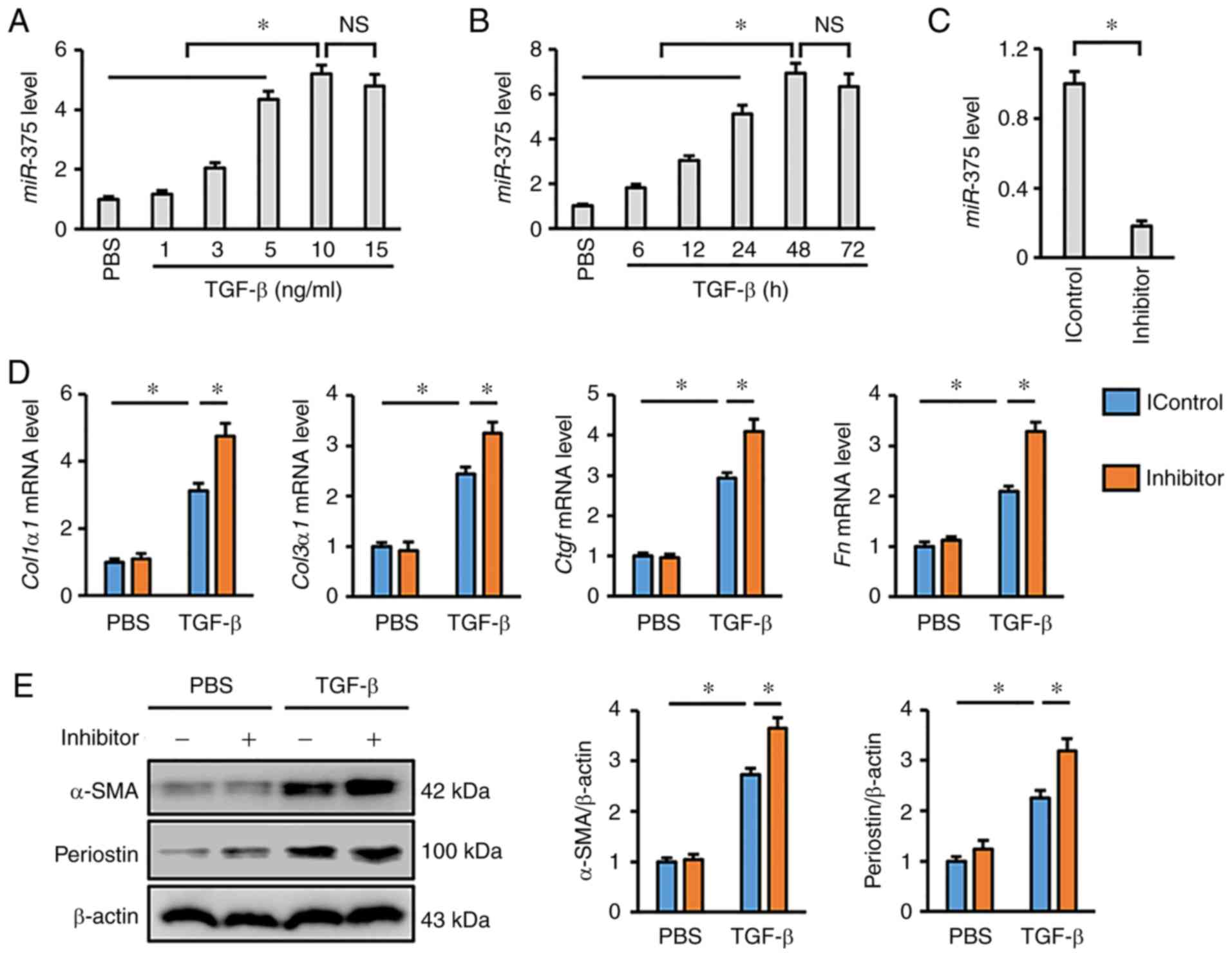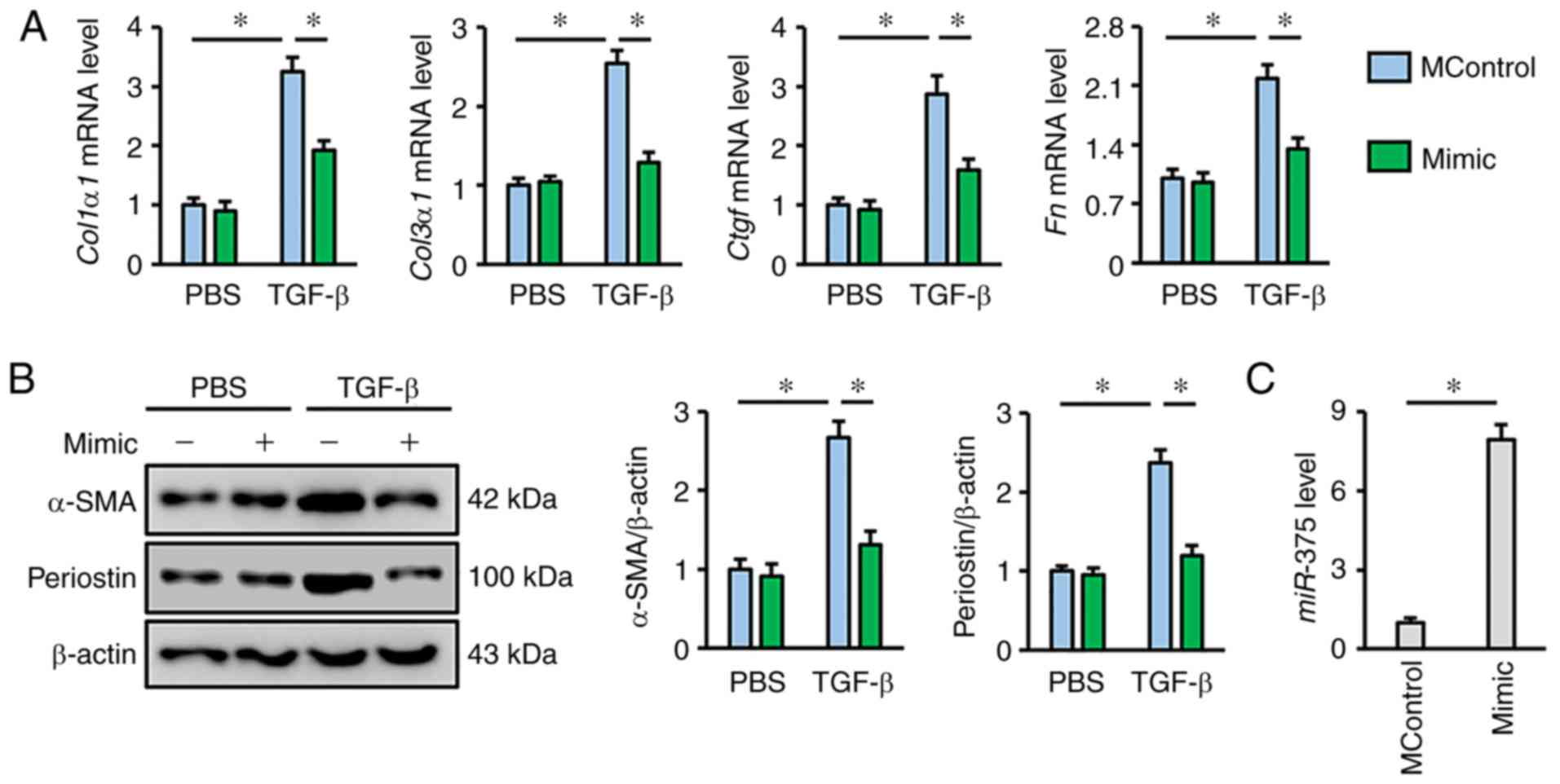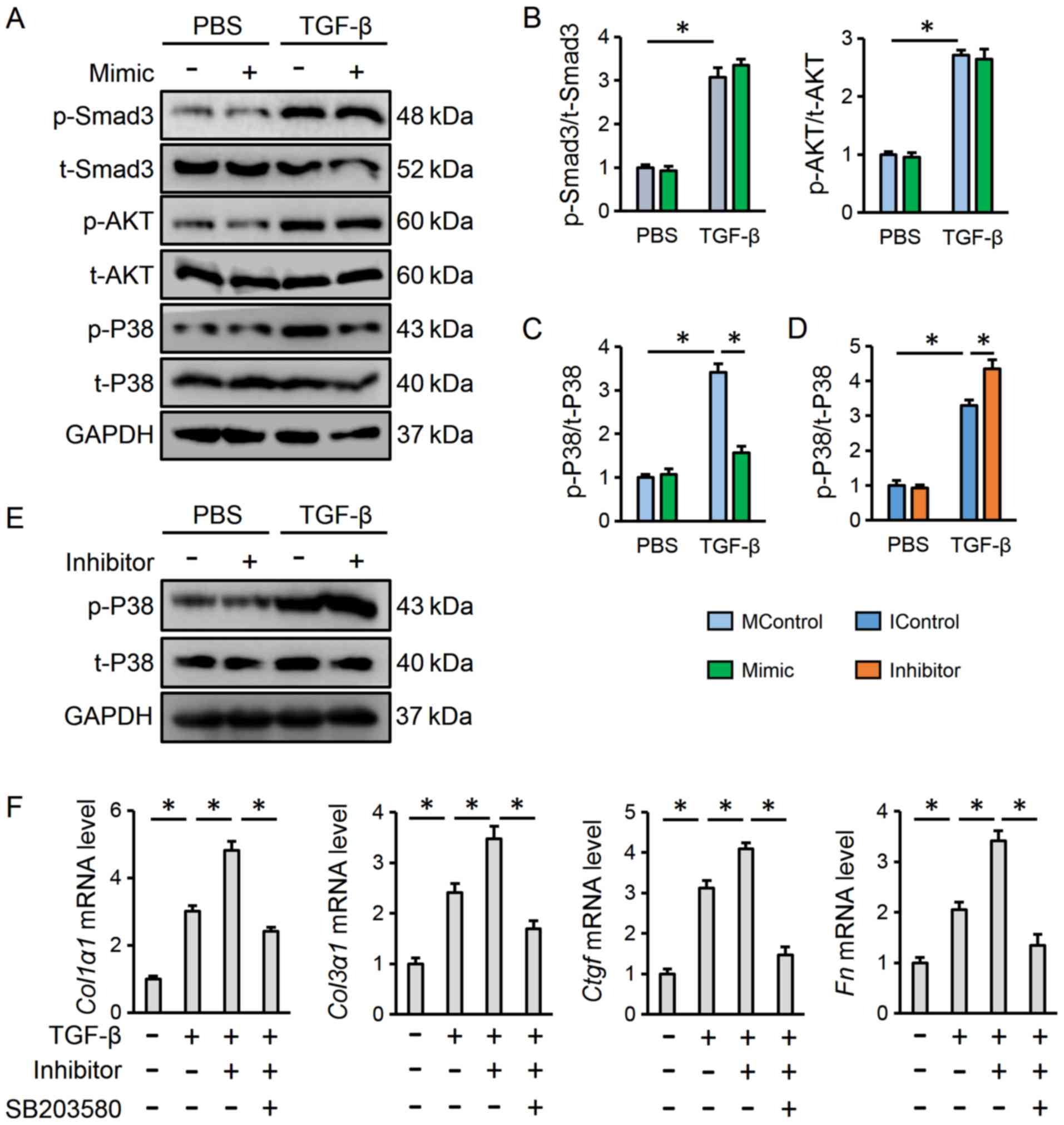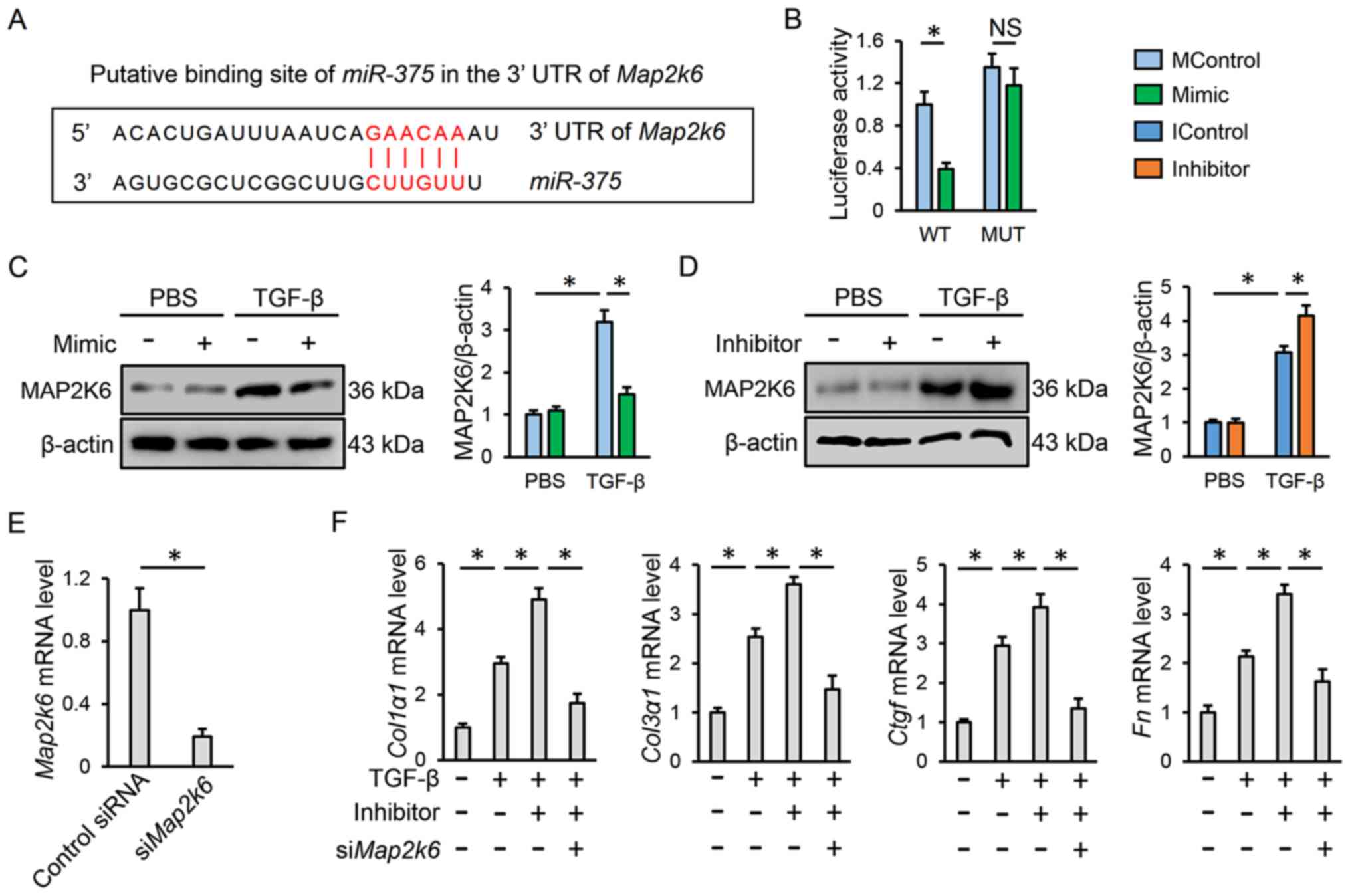|
1
|
Ng B, Dong J, D'Agostino G, Viswanathan S,
Widjaja AA, Lim WW, Ko N, Tan J, Chothani SP, Huang B, et al:
Interleukin-11 is a therapeutic target in idiopathic pulmonary
fibrosis. Sci Transl Med. 11:eaaw12372019. View Article : Google Scholar : PubMed/NCBI
|
|
2
|
Wolters PJ, Collard HR and Jones KD:
Pathogenesis of idiopathic pulmonary fibrosis. Annu Rev Pathol.
9:157–179. 2014. View Article : Google Scholar : PubMed/NCBI
|
|
3
|
Hung C, Linn G, Chow YH, Kobayashi A,
Mittelsteadt K, Altemeier WA, Gharib SA, Schnapp LM and Duffield
JS: Role of lung pericytes and resident fibroblasts in the
pathogenesis of pulmonary fibrosis. Am J Respir Crit Care Med.
188:820–830. 2013. View Article : Google Scholar : PubMed/NCBI
|
|
4
|
Lin X, Sime PJ, Xu H, Williams MA, LaRussa
L, Georas SN and Guo J: Yin yang 1 is a novel regulator of
pulmonary fibrosis. Am J Respir Crit Care Med. 183:1689–1697. 2011.
View Article : Google Scholar : PubMed/NCBI
|
|
5
|
Chen Y, Zhao X, Sun J, Su W, Zhang L, Li
Y, Liu Y, Zhang L, Lu Y, Shan H and Liang H: YAP1/Twist promotes
fibroblast activation and lung fibrosis that conferred by miR-15a
loss in IPF. Cell Death Differ. 26:1832–1844. 2019. View Article : Google Scholar : PubMed/NCBI
|
|
6
|
Celada LJ, Kropski JA, Herazo-Maya JD, Luo
W, Creecy A, Abad AT, Chioma OS, Lee G, Hassell NE, Shaginurova GI,
et al: PD-1 up-regulation on CD4+ T cells promotes
pulmonary fibrosis through STAT3-mediated IL-17A and TGF-β1
production. Sci Transl Med. 10:eaar83562018. View Article : Google Scholar : PubMed/NCBI
|
|
7
|
Wei Y, Kim TJ, Peng DH, Duan D, Gibbons
DL, Yamauchi M, Jackson JR, Le Saux CJ, Calhoun C, Peters J, et al:
Fibroblast-specific inhibition of TGF-β1 signaling attenuates lung
and tumor fibrosis. J Clin Invest. 127:3675–3688. 2017. View Article : Google Scholar : PubMed/NCBI
|
|
8
|
Schmierer B and Hill CS: TGFbeta-SMAD
signal transduction: Molecular specificity and functional
flexibility. Nat Rev Mol Cell Biol. 8:970–982. 2007. View Article : Google Scholar : PubMed/NCBI
|
|
9
|
Zhang X, Ma ZG, Yuan YP, Xu SC, Wei WY,
Song P, Kong CY, Deng W and Tang QZ: Rosmarinic acid attenuates
cardiac fibrosis following long-term pressure overload via
AMPKα/Smad3 signaling. Cell Death Dis. 9:1022018. View Article : Google Scholar : PubMed/NCBI
|
|
10
|
Derynck R and Zhang YE: Smad-dependent and
Smad-independent pathways in TGF-beta family signalling. Nature.
425:577–584. 2003. View Article : Google Scholar : PubMed/NCBI
|
|
11
|
Budas GR, Boehm M, Kojonazarov B,
Viswanathan G, Tian X, Veeroju S, Novoyatleva T, Grimminger F,
Hinojosa-Kirschenbaum F, Ghofrani HA, et al: ASK1 inhibition halts
disease progression in preclinical models of pulmonary arterial
hypertension. Am J Respir Crit Care Med. 197:373–385. 2018.
View Article : Google Scholar : PubMed/NCBI
|
|
12
|
Avivi-Green C, Singal M and Vogel WF:
Discoidin domain receptor 1-deficient mice are resistant to
bleomycin-induced lung fibrosis. Am J Respir Crit Care Med.
174:420–427. 2006. View Article : Google Scholar : PubMed/NCBI
|
|
13
|
Molkentin JD, Bugg D, Ghearing N, Dorn LE,
Kim P, Sargent MA, Gunaje J, Otsu K and Davis J:
Fibroblast-specific genetic manipulation of p38 mitogen-activated
protein kinase in vivo reveals its central regulatory role in
fibrosis. Circulation. 136:549–561. 2017. View Article : Google Scholar : PubMed/NCBI
|
|
14
|
Yoshida K, Kuwano K, Hagimoto N, Watanabe
K, Matsuba T, Fujita M, Inoshima I and Hara N: MAP kinase
activation and apoptosis in lung tissues from patients with
idiopathic pulmonary fibrosis. J Pathol. 198:388–396. 2002.
View Article : Google Scholar : PubMed/NCBI
|
|
15
|
Matsuoka H, Arai T, Mori M, Goya S, Kida
H, Morishita H, Fujiwara H, Tachibana I, Osaki T and Hayashi S: A
p38 MAPK inhibitor, FR-167653, ameliorates murine bleomycin-induced
pulmonary fibrosis. Am J Physiol Lung Cell Mol Physiol.
283:L103–L112. 2002. View Article : Google Scholar : PubMed/NCBI
|
|
16
|
Cao Y, Liu Y, Ping F, Yi L, Zeng Z and Li
Y: miR-200b/c attenuates lipopolysaccharide-induced early pulmonary
fibrosis by targeting ZEB1/2 via p38 MAPK and TGF-β/smad3 signaling
pathways. Lab Invest. 98:339–359. 2018. View Article : Google Scholar : PubMed/NCBI
|
|
17
|
Underwood DC, Osborn RR, Bochnowicz S,
Webb EF, Rieman DJ, Lee JC, Romanic AM, Adams JL, Hay DW and
Griswold DE: SB 239063, a p38 MAPK inhibitor, reduces neutrophilia,
inflammatory cytokines, MMP-9, and fibrosis in lung. Am J Physiol
Lung Cell Mol Physiol. 279:L895–L902. 2000. View Article : Google Scholar : PubMed/NCBI
|
|
18
|
Yuan J, Liu H, Gao W, Zhang L, Ye Y, Yuan
L, Ding Z, Wu J, Kang L, Zhang X, et al: MicroRNA-378 suppresses
myocardial fibrosis through a paracrine mechanism at the early
stage of cardiac hypertrophy following mechanical stress.
Theranostics. 8:2565–2582. 2018. View Article : Google Scholar : PubMed/NCBI
|
|
19
|
Qiao J, Zhao J, Chang S, Sun Q, Liu N,
Dong J, Chen Y, Yang D, Ye D, Liu X, et al: MicroRNA-153 improves
the neurogenesis of neural stem cells and enhances the cognitive
ability of aged mice through the notch signaling pathway. Cell
Death Differ. 27:808–825. 2020. View Article : Google Scholar : PubMed/NCBI
|
|
20
|
Treiber T, Treiber N and Meister G:
Regulation of microRNA biogenesis and its crosstalk with other
cellular pathways. Nat Rev Mol Cell Biol. 20:5–20. 2019. View Article : Google Scholar : PubMed/NCBI
|
|
21
|
Seo HH, Lee S, Lee CY, Lee J, Shin S, Song
BW, Kim IK, Choi JW, Lim S, Kim SW and Hwang KC: Multipoint
targeting of TGF-β/Wnt transactivation circuit with microRNA 384-5p
for cardiac fibrosis. Cell Death Differ. 26:1107–1123. 2019.
View Article : Google Scholar : PubMed/NCBI
|
|
22
|
Sonneville F, Ruffin M, Coraux C,
Rousselet N, Le Rouzic P, Blouquit-Laye S, Corvol H and Tabary O:
MicroRNA-9 downregulates the ANO1 chloride channel and contributes
to cystic fibrosis lung pathology. Nat Commun. 8:7102017.
View Article : Google Scholar : PubMed/NCBI
|
|
23
|
Xiao J, Meng XM, Huang XR, Chung AC, Feng
YL, Hui DS, Yu CM, Sung JJ and Lan HY: miR-29 inhibits
bleomycin-induced pulmonary fibrosis in mice. Mol Ther.
20:1251–1260. 2012. View Article : Google Scholar : PubMed/NCBI
|
|
24
|
Montgomery RL, Yu G, Latimer PA, Stack C,
Robinson K, Dalby CM, Kaminski N and van Rooij E: MicroRNA mimicry
blocks pulmonary fibrosis. EMBO Mol Med. 6:1347–1356. 2014.
View Article : Google Scholar : PubMed/NCBI
|
|
25
|
Liang H, Xu C, Pan Z, Zhang Y, Xu Z, Chen
Y, Li T, Li X, Liu Y, Huangfu L, et al: The antifibrotic effects
and mechanisms of microRNA-26a action in idiopathic pulmonary
fibrosis. Mol Ther. 22:1122–1133. 2014. View Article : Google Scholar : PubMed/NCBI
|
|
26
|
Herrera J, Beisang DJ, Peterson M, Forster
C, Gilbertsen A, Benyumov A, Smith K, Korenczuk CE, Barocas VH,
Guenther K, et al: Dicer1 deficiency in the idiopathic pulmonary
fibrosis fibroblastic focus promotes fibrosis by suppressing
microRNA biogenesis. Am J Respir Crit Care Med. 198:486–496. 2018.
View Article : Google Scholar : PubMed/NCBI
|
|
27
|
Kong KL, Kwong DL, Chan TH, Law SY, Chen
L, Li Y, Qin YR and Guan XY: MicroRNA-375 inhibits tumour growth
and metastasis in oesophageal squamous cell carcinoma through
repressing insulin-like growth factor 1 receptor. Gut. 61:33–42.
2012. View Article : Google Scholar : PubMed/NCBI
|
|
28
|
Chen LJ, Li XY, Zhao YQ, Liu WJ, Wu HJ,
Liu J, Mu XQ and Wu HB: Down-regulated microRNA-375 expression as a
predictive biomarker in non-small cell lung cancer brain metastasis
and its prognostic significance. Pathol Res Pract. 213:882–888.
2017. View Article : Google Scholar : PubMed/NCBI
|
|
29
|
Shao Y, Geng Y, Gu W, Huang J, Ning Z and
Pei H: Prognostic significance of microRNA-375 downregulation in
solid tumors: A meta-analysis. Dis Markers. 2014:6261852014.
View Article : Google Scholar : PubMed/NCBI
|
|
30
|
Saidi A, Kasabova M, Vanderlynden L,
Wartenberg M, Kara-Ali GH, Marc D, Lecaille F and Lalmanach G:
Curcumin inhibits the TGF-β1-dependent differentiation of lung
fibroblasts via PPARγ-driven upregulation of cathepsins B and L.
Sci Rep. 9:4912019. View Article : Google Scholar : PubMed/NCBI
|
|
31
|
Zhu L, Wang J, Kong W, Huang J, Dong B,
Huang Y, Xue W and Zhang J: LSD1 inhibition suppresses the growth
of clear cell renal cell carcinoma via upregulating P21 signaling.
Acta Pharm Sin B. 9:324–334. 2019. View Article : Google Scholar : PubMed/NCBI
|
|
32
|
Wang YM, Zheng YF, Yang SY, Yang ZM, Zhang
LN, He YQ, Gong XH, Liu D, Finnell RH, Qiu ZL, et al: MicroRNA-197
controls ADAM10 expression to mediate MeCP2′s role in the
differentiation of neuronal progenitors. Cell Death Differ.
26:1863–1879. 2019. View Article : Google Scholar : PubMed/NCBI
|
|
33
|
Lee J, Heo J and Kang H: miR-92b-3p-TSC1
axis is critical for mTOR signaling-mediated vascular smooth muscle
cell proliferation induced by hypoxia. Cell Death Differ.
26:1782–1795. 2019. View Article : Google Scholar : PubMed/NCBI
|
|
34
|
Fujiki K, Inamura H, Sugaya T and Matsuoka
M: Blockade of ALK4/5 signaling suppresses cadmium- and
erastin-induced cell death in renal proximal tubular epithelial
cells via distinct signaling mechanisms. Cell Death Differ.
26:2371–2385. 2019. View Article : Google Scholar : PubMed/NCBI
|
|
35
|
Guo Q, Li C, Zhou W, Chen X, Zhang Y, Lu
Y, Zhang Y, Chen Q, Liang D, Sun T and Jiang C: GLUT1-mediated
effective anti-miRNA21 pompon for cancer therapy. Acta Pharm Sin B.
9:832–842. 2019. View Article : Google Scholar : PubMed/NCBI
|
|
36
|
Zhang X, Hu C, Kong CY, Song P, Wu HM, Xu
SC, Yuan YP, Deng W, Ma ZG and Tang QZ: FNDC5 alleviates oxidative
stress and cardiomyocyte apoptosis in doxorubicin-induced
cardiotoxicity via activating AKT. Cell Death Differ. 27:540–555.
2020. View Article : Google Scholar : PubMed/NCBI
|
|
37
|
Li X, Tian Y, Tu MJ, Ho PY, Batra N and Yu
AM: Bioengineered miR-27b-3p and miR-328-3p modulate drug
metabolism and disposition via the regulation of target ADME gene
expression. Acta Pharm Sin B. 9:639–647. 2019. View Article : Google Scholar : PubMed/NCBI
|
|
38
|
Zhang X, Zhu JX, Ma ZG, Wu HM, Xu SC, Song
P, Kong CY, Yuan YP, Deng W and Tang QZ: Rosmarinic acid alleviates
cardiomyocyte apoptosis via cardiac fibroblast in
doxorubicin-induced cardiotoxicity. Int J Biol Sci. 15:556–567.
2019. View Article : Google Scholar : PubMed/NCBI
|
|
39
|
Hu C, Zhang X, Wei W, Zhang N, Wu H, Ma Z,
Li L, Deng W and Tang Q: Matrine attenuates oxidative stress and
cardiomyocyte apoptosis in doxorubicin-induced cardiotoxicity via
maintaining AMPKα/UCP2 pathway. Acta Pharm Sin B. 9:690–701. 2019.
View Article : Google Scholar : PubMed/NCBI
|
|
40
|
Chen L, Chen L, Qin Z, Lei J, Ye S, Zeng
K, Wang H, Ying M, Gao J, Zeng S and Yu L: Upregulation of
miR-489-3p and miR-630 inhibits oxaliplatin uptake in renal cell
carcinoma by targeting OCT2. Acta Pharm Sin B. 9:1008–1020. 2019.
View Article : Google Scholar : PubMed/NCBI
|
|
41
|
Xiao D, Zhang Y, Wang R, Fu Y, Zhou T,
Diao H, Wang Z, Lin Y, Li Z, Wen L, et al: Emodin alleviates
cardiac fibrosis by suppressing activation of cardiac fibroblasts
via upregulating metastasis associated protein 3. Acta Pharm Sin B.
9:724–733. 2019. View Article : Google Scholar : PubMed/NCBI
|
|
42
|
Hecker L, Vittal R, Jones T, Jagirdar R,
Luckhardt TR, Horowitz JC, Pennathur S, Martinez FJ and Thannickal
VJ: NADPH oxidase-4 mediates myofibroblast activation and
fibrogenic responses to lung injury. Nat Med. 15:1077–1081. 2009.
View Article : Google Scholar : PubMed/NCBI
|
|
43
|
Garikipati VNS, Verma SK, Jolardarashi D,
Cheng Z, Ibetti J, Cimini M, Tang Y, Khan M, Yue Y, Benedict C, et
al: Therapeutic inhibition of miR-375 attenuates post-myocardial
infarction inflammatory response and left ventricular dysfunction
via PDK-1-AKT signalling axis. Cardiovasc Res. 113:938–949. 2017.
View Article : Google Scholar : PubMed/NCBI
|
|
44
|
Zhang PX, Cheng J, Zou S, D'Souza AD, Koff
JL, Lu J, Lee PJ, Krause DS, Egan ME and Bruscia EM:
Pharmacological modulation of the AKT/microRNA-199a-5p/CAV1 pathway
ameliorates cystic fibrosis lung hyper-inflammation. Nat Commun.
6:62212015. View Article : Google Scholar : PubMed/NCBI
|
|
45
|
Yao L, Conforti F, Hill C, Bell J,
Drawater L, Li J, Liu D, Xiong H, Alzetani A, Chee SJ, et al:
Paracrine signalling during ZEB1-mediated epithelial-mesenchymal
transition augments local myofibroblast differentiation in lung
fibrosis. Cell Death Differ. 26:943–957. 2019. View Article : Google Scholar : PubMed/NCBI
|
|
46
|
Hoyles RK, Derrett-Smith EC, Khan K,
Shiwen X, Howat SL, Wells AU, Abraham DJ and Denton CP: An
essential role for resident fibroblasts in experimental lung
fibrosis is defined by lineage-specific deletion of high-affinity
type II transforming growth factor β receptor. Am J Respir Crit
Care Med. 183:249–261. 2011. View Article : Google Scholar : PubMed/NCBI
|
|
47
|
Zhang H, Mishra A, Chintagari NR, Gou D
and Liu L: Micro-RNA-375 inhibits lung surfactant secretion by
altering cytoskeleton reorganization. IUBMB Life. 62:78–83.
2010.PubMed/NCBI
|
|
48
|
Sheng W, Feng Z, Song Q, Niu H and Miao G:
Modulation of mesenchymal stem cells with miR-375 to improve their
therapeutic outcome during scar formation. Am J Transl Res.
8:2079–2087. 2016.PubMed/NCBI
|


















